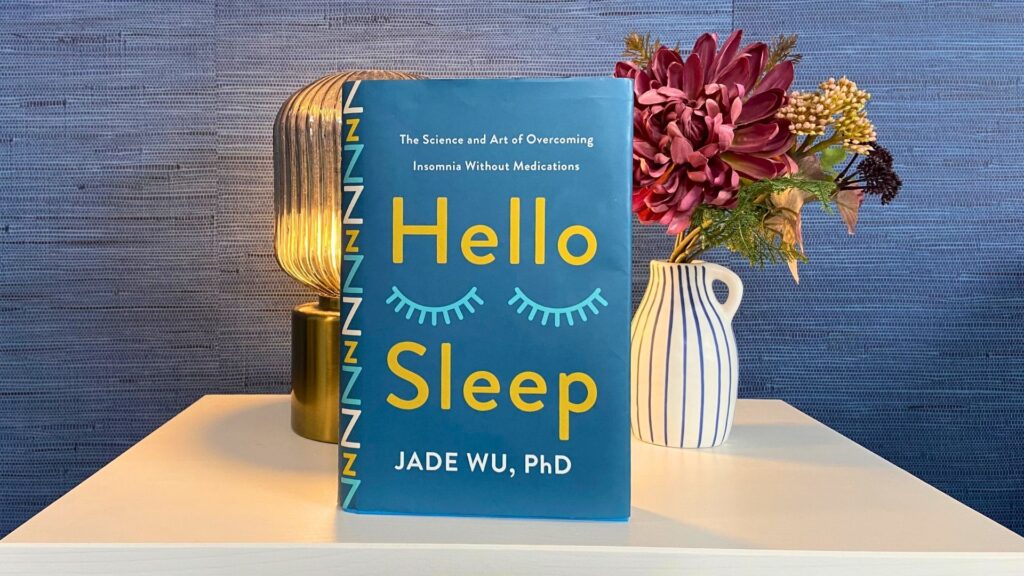
Do you consider sleep to be your friend? Well, Dr. Jade Wu thinks you should. In her new book, Hello Sleep: The Science and Art of Overcoming Insomnia Without Medications, Wu not only lays out a step-by-step guide to overcome insomnia, but asks the reader to completely reframe their relationship with sleep.
Wu is a board-certified behavioral sleep medicine specialist and researcher at Duke University School of Medicine and brings her vast experience treating patients with insomnia in her clinic to her Hello Sleep program, which is derived from the evidence-based cognitive behavioral therapy for insomnia (CBT-I) that Wu uses with her own patients.
The book functions as a primer on what insomnia actually is, with thorough breakdowns of the science behind Wu’s program, but also as a literal step-by-step guide to implement the Hello Sleep program in your own life, including workbook-style charts, checklists, and fill-in-the-blank sheets.
Throughout all the guidelines and information, Wu challenges the reader to change their relationship with sleep from something to be “fixed” — or actually, to even view it as a relationship at all. She implores us to see sleep not as an engineering problem that needs solving, but a friend to rebuild our relationship with.
How to Build a Relationship With Your Sleep
What does it mean to view sleep as a friend? Wu lays out anecdotes from patients in her clinic to showcase just how hard many people work to cure their insomnia — following perfect sleep hygiene routines, going to bed as early as possible, meticulously tracking their sleep data to pinpoint the issues. But none of this seems to work and, in fact, can make insomnia all the more frustrating.
The reality, she argues, is you can’t control your sleep. But also, you don’t need to. This is where sleep as a friend comes in: just like you can’t force your friends to hang out with you or to act exactly the way you want them to, you can’t force sleep. And just like overly criticizing and analyzing a friend would likely drive them away, the same is true for sleep. We can’t force it, but we can strengthen the relationship with sleep by giving our bodies what they need and removing the pressure for “perfect sleep”.
Wu argues that we can’t “optimize” or “hack” our way to perfect sleep and that such acts of “sleep effort” can actually make insomnia worse — instead, we should try to see sleep as a friend who does amazing things for us, but who we have to rebuild our relationship with to get those benefits. How do you do that? The Hello Sleep program guides you through it.
The Hello Sleep Program
Hello Sleep is broken down into four parts, in which Wu lays the groundwork for the reader to understand the basis for sleep health and why her program works, along with detailed instructions and guidelines to actually follow the program yourself.
In part one, “Get to Know Your Sleep,” Wu tackles the question of what healthy sleep actually is, as well as what chronic insomnia really is (hint: it’s not the same thing as sleep deprivation). She clarifies that insomnia is treatable — very treatable — but not with the usual answers we think would fix it, like better sleep hygiene, going to bed earlier, or reducing screen time.
In part two, “The Big Reset,” Wu walks through concepts like sleep drive, conditioned arousal, how insomnia causes fatigue (and how to combat it with light and movement), and “daytime skills for quieting a racing mind at night,” as well as kicking off the program with the eponymous “big reset.” This section is structured so you can work your way through this informational content as you go through the first four weeks of your Big Reset.
The Big Reset is the meat of the Hello Sleep program, in which you’ll “reset” your sleep. Wu instructs the reader on how to keep sleep logs, in order to calculate how much time you are spending in bed, how long it takes to fall asleep, time spent awake at night, total sleep time, and sleep efficiency. This information from the logs will help you to determine your earliest allowed bedtime and rise time, which you’ll have to abide by every day as you follow this first part of the Hello Sleep program.
Part three, titled “Going Deeper into the Relationship” digs into more common issues and questions, such as the self-fulfilling prophecy of insomnia, how sleep effort reinforces insomnia, how to get off sleep medications, and hot topics in the sleep world like screens and caffeine.
Since the reader is theoretically about a month into their Big Reset, Wu uses this point in the book as a check-in: If the reset is starting to work, she clarifies where you can start to relax about the rules, and if it’s not working, she runs through where problem points might be. At the end of this section, she also discusses how to carry what you’ve learned from the book and the program forward through the rest of your life — essentially, how to keep up the healthy relationship with sleep you’ve cultivated.
In the final section of the book, “Changes and Challenges in Your Relationship with Sleep,” Wu acknowledges that your sleep won’t always be perfect for the rest of your life after completing the Hello Sleep program. Changes like pregnancy, menopause, or getting older can affect sleep, as can psychiatric conditions like PTSD, depression, or anxiety. Plus, insomnia might not be the only sleep disorder a person is dealing with.
Much like her approach to insomnia generally, Wu approaches these other sleep difficulties with empathy. Relying on the underlying philosophy of the Hello Sleep program, she walks the reader through specific strategies for dealing with each challenge (pregnancy, aging, depression, etc.), as well as clarifying where to seek help from medical professionals.
Wu’s Refreshing Approach
Aside from the helpful instructions and insightful information, part of what makes Hello Sleep a great read is Wu’s refreshing perspective on sleep health and habits. What you won’t find in this book are scare tactics or dubious claims that not getting exactly seven to eight hours of sleep will cause you to develop Alzheimer’s, strict rules about exactly when and how you should sleep, or exhaustive lists of sleep hygiene routines you need to follow to have perfect sleep.
Instead, Wu meets insomniacs with understanding, care, and a realistic view of how people actually live their lives. While you will have to follow some guidelines as you go through the Hello Sleep program, the stated goal is not to have you follow these exact suggestions for life. Rather, Wu seeks to help readers get back to the place when sleep was easy and didn’t require lots of thought, preparation, special products, and overall effort. After all, the whole point of sleeping better is to live better, right?
Wu shows there are basic guidelines to follow for sleep health and overcoming insomnia that apply to most people, but they don’t need to be hard-and-fast, all-or-nothing rules. Allow yourself flexibility, do what’s realistic for you, and be forgiving with yourself when you do have sleep problems. Plus, everyone is different — where one person might need to let go of the strict rules they follow and the anxiety-inducing sleep effort they put into curing their insomnia, another person might need to put more guidelines in place for themselves to ensure they’re allowing time to rest.
Final Thoughts
Whether you suffer from insomnia or not, Hello Sleep makes a great read for anyone who is interested in sleep. Beyond the tools to overcome insomnia, this book will leave you with a deeper understanding and appreciation for sleep, the amazing biological function we spend such a significant portion of our lives doing, and leave you ready to rebuild your relationship with that old friend by saying, “Hello sleep.”
Hello Sleep is available through Amazon, Barnes & Noble, Books-A-Million, Bookshop, Powell’s, and Target.



























